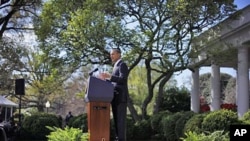U.S. Senators on Thursday voted down a bill to end $4 billion in tax breaks for oil companies, moments after President Barack Obama called on them to pass it. The president is putting his energy policy at the center of his re-election campaign.
The president began his address in the White House Rose Garden with a challenge to lawmakers.
“Members of Congress have a simple choice to make. They can stand with big oil companies or they can stand with the American people,” said Obama.
Shortly after the president spoke, the Senate failed to get the two-thirds majority needed to pass the bill. It was the third time that legislation to reduce the subsidies was voted down.
White House Press Secretary Jay Carney said the president would continue his efforts to cut tax breaks for oil companies.
“Well, you can be sure he will not stop calling for this because we simply cannot afford it. And it makes zero sense to have the American taxpayers subsidize oil and gas companies that are enjoying record profits.”
Two Republicans voted to move the legislation forward, but four members of the president’s own Democratic Party voted against it.
The top Senate Republican, Minority Leader Mitch McConnell, said before the vote that the legislation would do nothing to ease gasoline prices.
“Faced with skyrocketing gas prices, Senate Democrats turned to a bill that even they admit does not lower them. And then to make matters worse, they blocked Republicans from offering anything that might,” said McConnell.
Republicans say that repealing the subsidies would be a tax increase on energy producers and would discourage the production of domestic oil.
Americans are concerned about the rising price of gasoline, and Obama is framing his proposal as a way to ease high fuel prices.
“It is like hitting the American people twice. You are already paying a premium at the pump right now. And on top of that, Congress, up until this point, has thought it was a good idea to send billions of dollars more of tax dollars to the oil industry,” said Obama.
And while the president wants to end tax breaks for the oil industry, he proposes more government help for alternative energy production.
“Investments in wind power and solar power and biofuels, in fuel-efficient cars and trucks and homes and buildings. That is the future. That is the only way we will break this cycle of high gas prices that happens year after year after year,” said Obama.
More than half of all Americans [54 percent] say they believe the president can do a great deal to affect gasoline prices, according to a recent CBS News/New York Times survey. But a recent Bloomberg poll shows that about two-thirds of those asked blame the oil companies and turmoil in the Middle East for rising prices.
One thing the president can do to affect fuel costs is to allow oil to be taken from the government’s strategic reserves. White House Spokesman Jay Carney said that has been discussed, but a decision has not been made.
“This is an option that remains on the table. A variety of other options remain on the table, something the president looks at. And I really do not have any other update on it for you,” said Carney.
Seven months before the presidential election, public opinion surveys show Obama’s small lead over Republican presidential hopeful Mitt Romney is increasing. But the state of the economy - including the price of gasoline - still is the main concern of American voters.
News
Senate Ignores Obama's Call to Cut Oil Tax Breaks
- By Kent Klein








